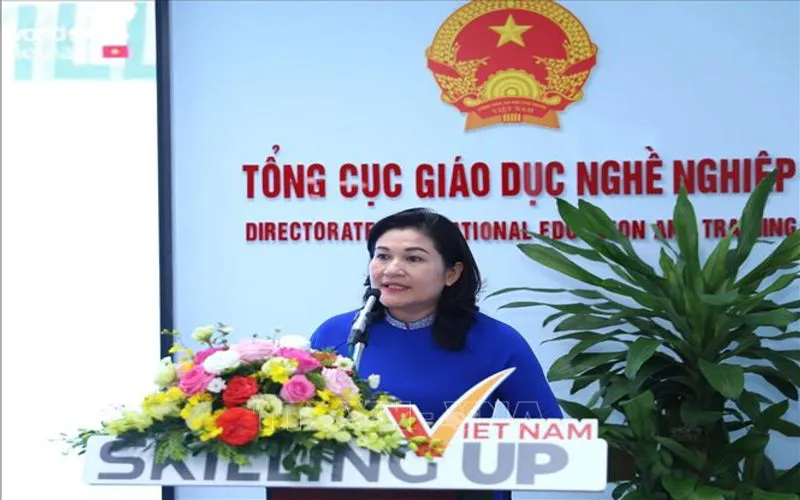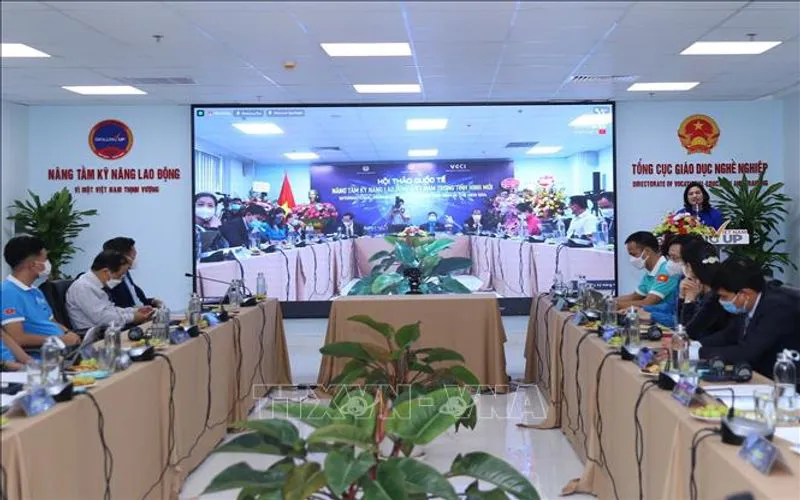Vietnam makes effort to rehabilitate its labor market
Job recovery is a challenge for many countries, including Vietnam as they have to realize dual goals.
Vietnam is making all effort to rehabilitate its labor market, Deputy Minister of Labor, War Invalids and Social Affairs (MoLISA) Nguyen Thi Ha said at an international conference with the theme "Enhancing Vietnamese labor skills in a new situation" in Hanoi on October 4.
The event is one of the activities in response to Vietnam Labor Skills Day [October 4] with the message "Improving internal resources, endogenous strength for national development by the power of skills and professional competence".
Addressing the conference, Ha said that Vietnam has been greatly affected by the Covid-19 pandemic, the labor market has encountered many fluctuations, the MoLISA has consulted many policies to support workers and pandemic-hit employers.
“The ministry has cooperated with ministries, localities, enterprises, and vocational education institutions in implementing programs and activities on skills development to meet the labor market requirements and the country's socio-economic development goals," the deputy minister said.
Deputy Minister of Labor, War Invalids and Social Affairs Nguyen Thi Ha delivers a speech. Photo: Hoang Hieu/VNA |
She added that the MoLISA has also issued and implemented a vocational education communication plan for the period of 2021-2025, promote enrollment and training under online platforms.
For her part, Nguyen Hong Ha, a representative of the International Labor Organization (ILO) in Vietnam, said that the prospect of job recovery is a challenge for many countries, including Vietnam when they have to realize "dual goals": pandemic fighting and socio-economic development in "new normal" period.
Besides, the ongoing Industrial Revolution 4.0 has accelerated the transition of jobs and skills to adapt to the structural adjustments of the global economy, Hong Ha noted.
The most recent report by the MoLISA, the General Statistics Office, and the ILO shows that by the end of the second quarter of 2021, Vietnam's labor force consists of 51.1 million people, of which skillful workers only reach 26.1%. The number of employees who have not received training and have not been recognized for their skills is 73.9%.
Hoang Quang Phong, Vice Chairman of the Vietnam Chamber of Commerce and Industry (VCCI), said that the above-mentioned figure shows that it is very important to training and improve advanced skills for workers.
Vietnamese workers have been facing numerous challenges, as well as taking advantage of new opportunities, Phong said, adding that it is necessary to give strategic solutions, improve labor skills in the new situation and the country's human resource capacity.
An overview of the conference in Hanoi. Photo: Hoang Hieu/VNA |
In an interview with The Hanoi Times, Truong Anh Dung, director of the Directorate of Vocational Education and Training under the MoLISA said that the successful experience of many countries around the world shows that the development of skilled labor force, especially skilled people play a particularly important role, contributing to the creation of outstanding labor productivity.
"The more skilled workers are present, the more foreign investors will be attracted. The application of new technologies helps increase labor productivity. Today, occupational skills are considered a new currency in the market. This is the factor that creates the competitiveness of every business, every country," Dung emphasized.
Earlier, President Nguyen Xuan Phuc on October 3 called for improving Vietnamese labor skills to build a prosperous country on the occasion of the Vietnam Labor Skills Day.
“Nowadays, the trend of strong globalization and international integration and impacts of the fourth Industrial Revolution is requiring an urgency for the enhancement of labor skills. The workforce with high qualifications, skills, and efficiency is an invaluable resource and a decisive factor for the development of each nation,” Phuc stressed.
The president called on employees nationwide to continuously study and improve professional skills, innovate themselves to enhance productivity and labor efficiency, especially amid the Covid-19 pandemic.
The State leader also expected the business community and employers to actively engage in vocational training, particularly for those affected by the pandemic.
As a high-quality and skilled workforce is a valuable resource and a decisive factor for the development of each country, President Phuc called on laborers across the country to ceaselessly learn and master skills, and be creative in improving productivity and efficiency.
He asked the National Assembly, the Government, ministries, agencies, and localities to prioritize resources and take drastic actions to advance the development of the skilled workforce.












